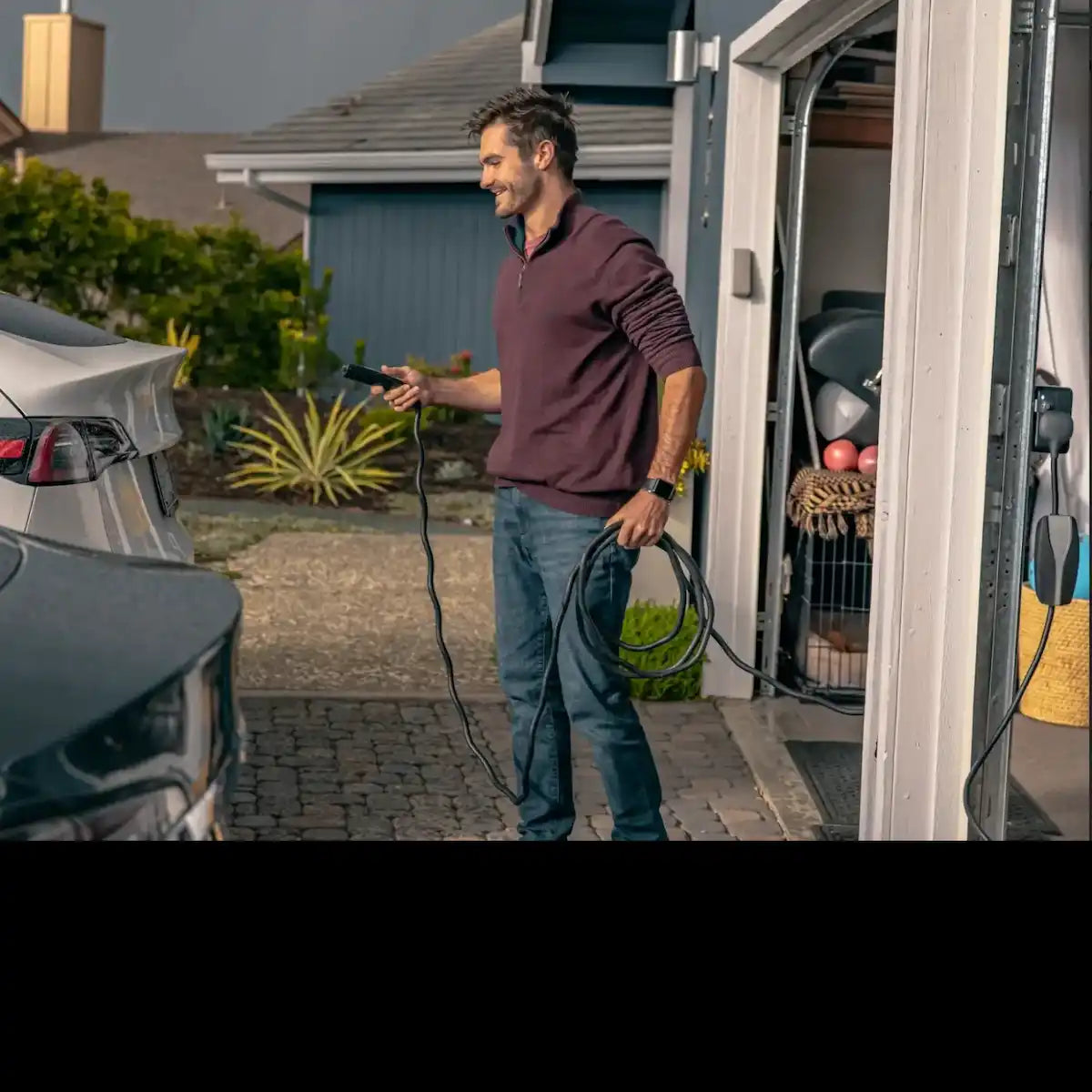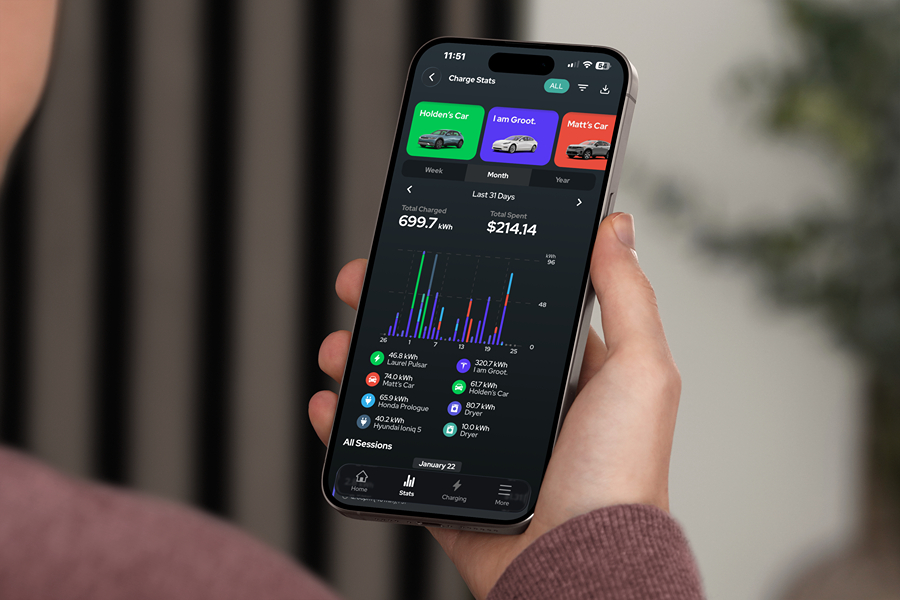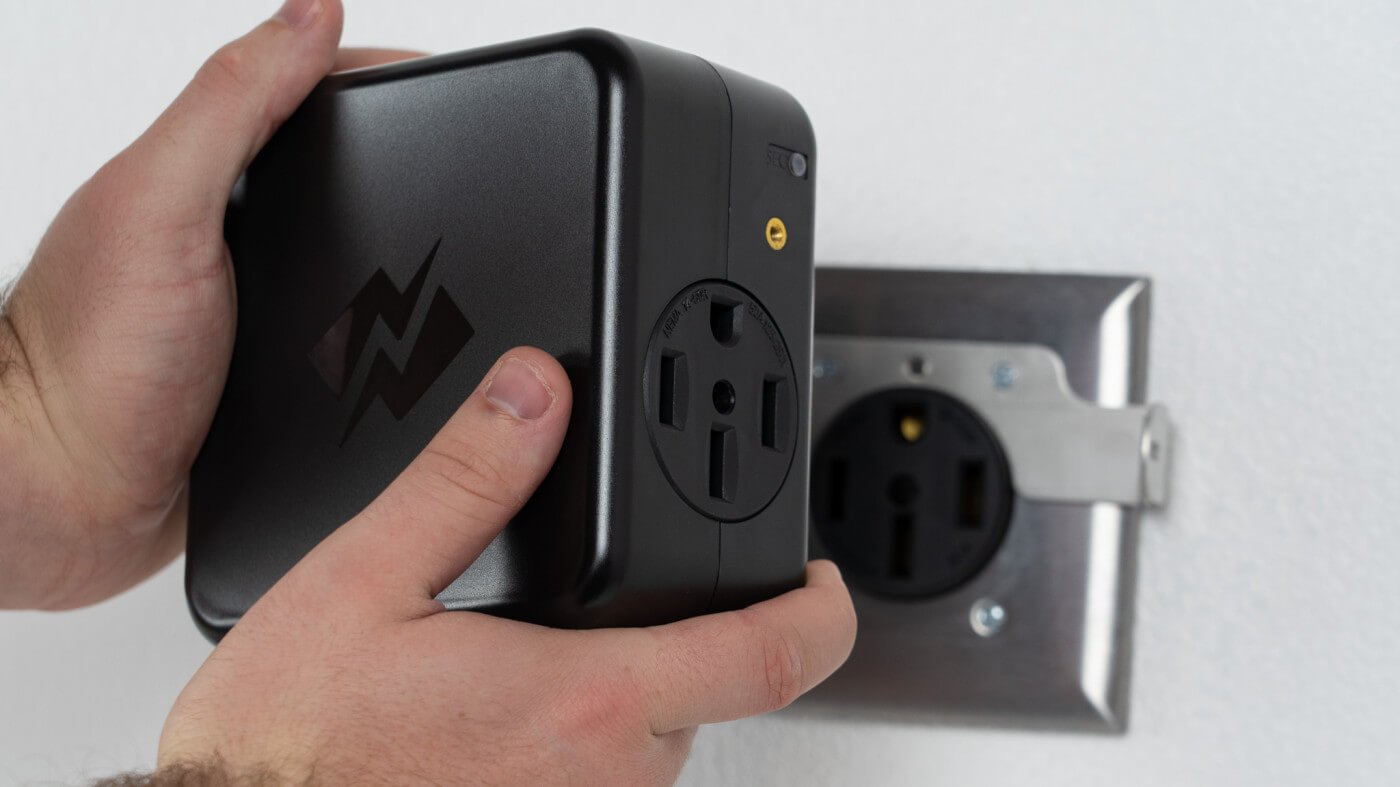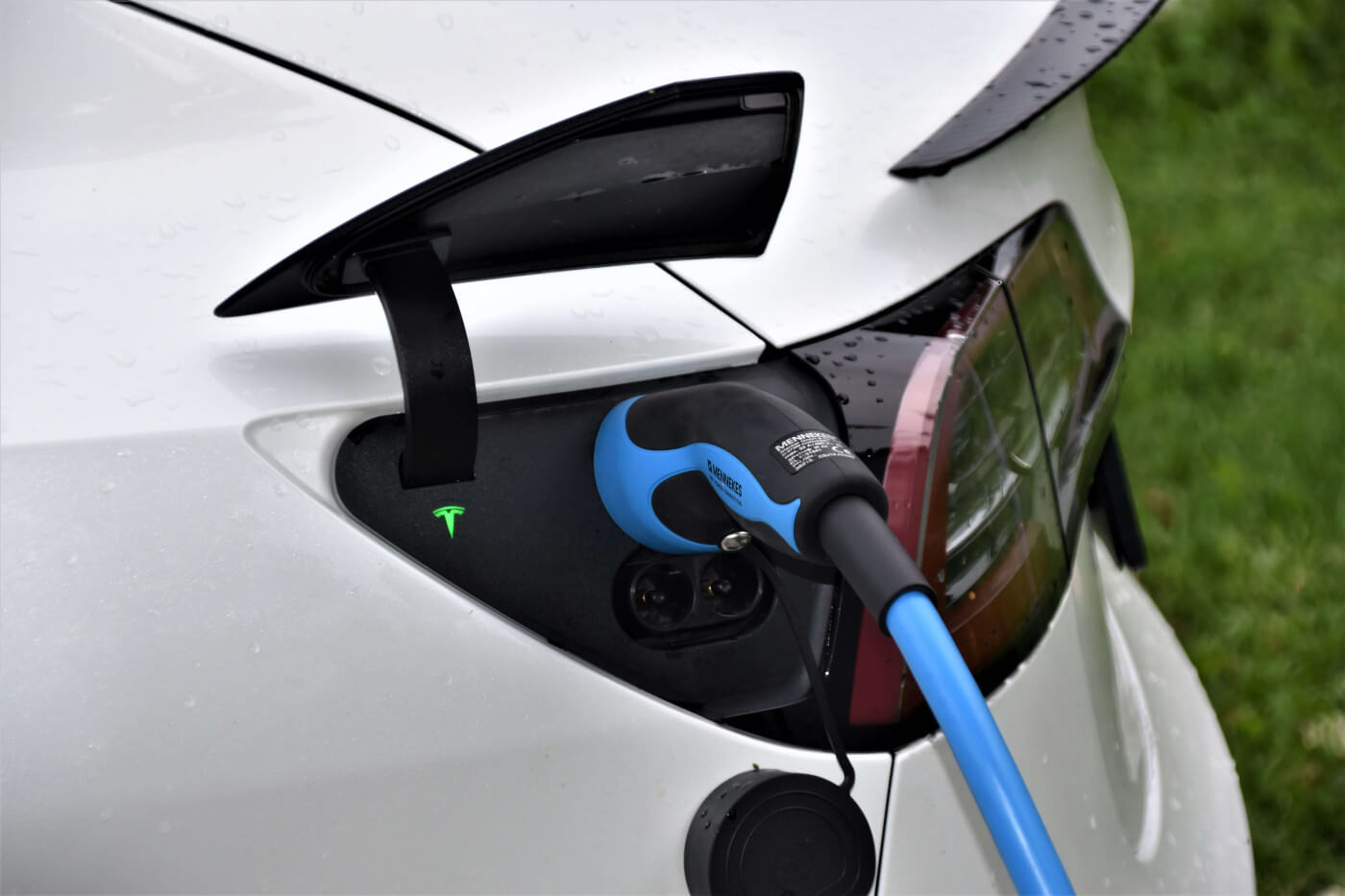
How Much Does It Cost to Install a Home EV Charging Station in 2025?
TL;DR
Key takeaways
- Learn how much it costs to install home EV charging and find ways to save based upon your home setup.
Short answer: Most homeowners pay $850–$2,700 for a basic Level 2 install (charger + labor + permit). Panel upgrades, long wire runs, or trenching can push totals to $5,000+. If you have an existing 240V outlet, a Smart Splitter typically brings the total to $300–$700 (or less) and avoids permits/electrician in many cases.
Updated: September 12, 2025.
Chances are if you are reading this you have either already purchased an electric vehicle (EV) or you are considering it. Either way, congratulations on your journey to cleaner transportation! As you may have already learned, electric cars are a bit different than conventional gas or diesel burning vehicles. EVs produce zero emissions, have less maintenance, and are both fun and quiet to drive.
One way EV drivers save more on ownership costs than gas or diesel drivers is by charging their car at home rather than at a public charging station. Charging an EV at home is far cheaper than gas at a gas station. Using national averages, it costs an EV around $10 to fully charge at home while it costs a gas car over $40 to fill up. There are often hidden costs associated with the actual installation of the outlet you need for charging your car at home. You may ask, “Well, how much does it cost to install a home charging station?” Below, we’ll break down that cost so you are best prepared to charge your electric car at home.
Cost Breakdown
There are four components to installing a home charging station: charging station, permit, electrical materials, and the electrician labor.
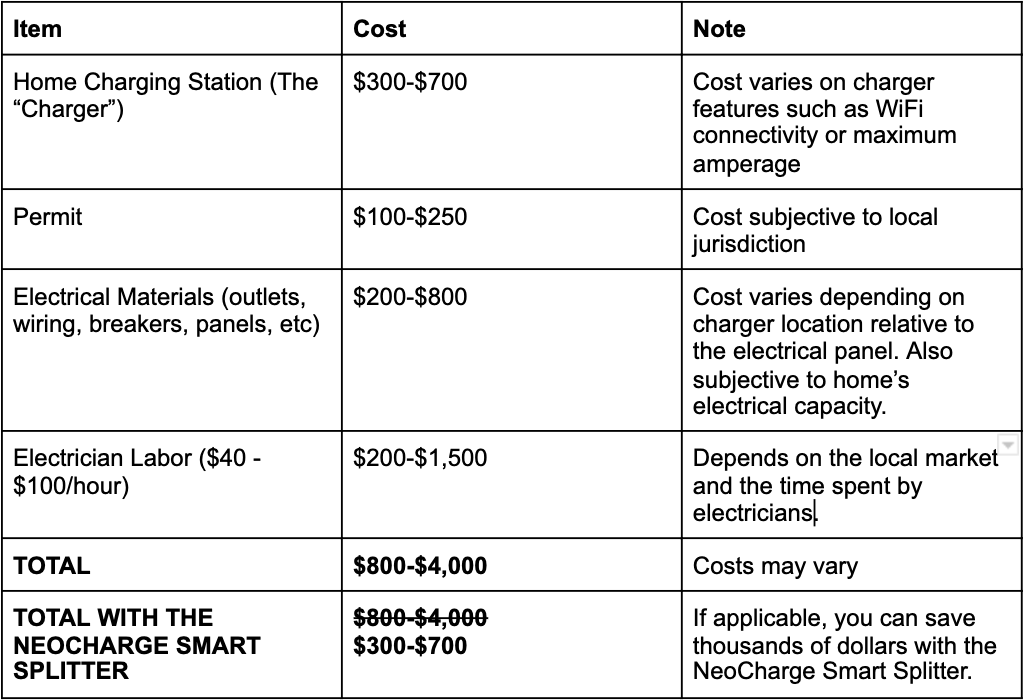
The cost to install a home charging station varies on a number of factors including when your home was built, the capacity of your electric panel, the complexity of the installation, and the proximity of your panel to your charger. Each of these aspects play a role in the cost, but depending on your setup, a Smart Splitter could save you an incredible amount of time and money.
The details of how these factors play a role in determining the cost to install a home charging station are outlined below and by the end of this article, you should have a fairly rough estimate of how much you can expect to pay to install a home charging station at your house.
Let’s begin!
Charging Station
The home charging station is technically known as the Electric Vehicle Supply Equipment (EVSE). However, is it commonly known as the charging station, or simply, the charger. There are three levels of EV charging (Level 1—the slowest, Level 2, and Level 3—the fastest). Home charging stations only consist of Level 1 and 2 varying depending on which charging level (voltage and amperage), cord length, and smart/WiFi capabilities, the charger can cost between $300 and $700.
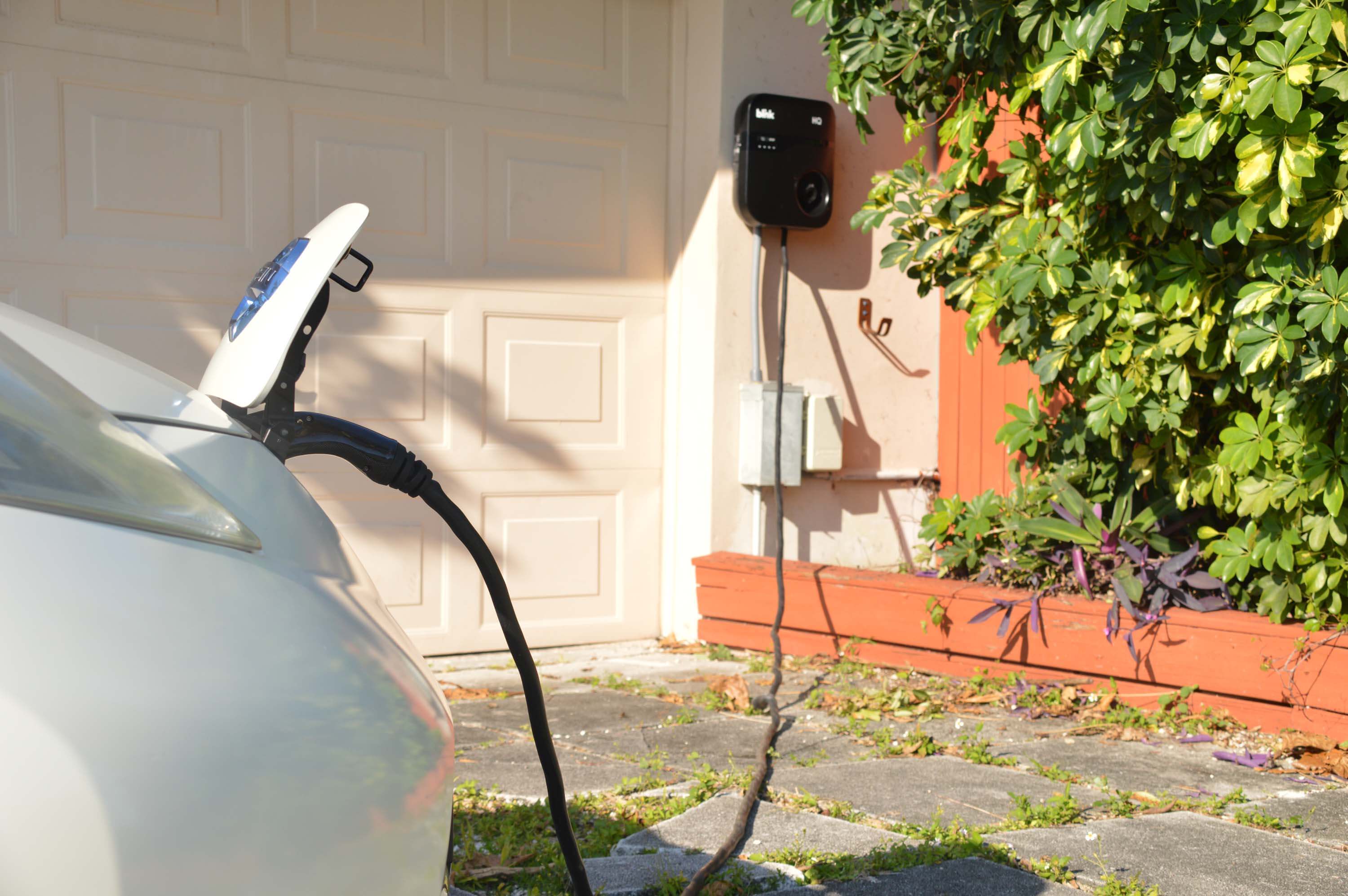
A generic Level 2 (240 Volt) charger that is NOT safety certified can be found on Amazon for as low as $200. However, we suggest finding a charger with proper safety certifications like the Tesla Mobile Connector that comes with all Teslas or the UL listed Level 2 Wallbox Pulsar Plus. 240V outlets can supply a lot of power and, if not managed safely, this can be very dangerous. Charge responsibly.
Do i need a permit? What NEC Code applies?
For most home charging station installations, a permit is required by the local jurisdiction. These permits ensure the electrical code is being followed for you and your homes safety. Since it is highly recommended EV drivers install a Level 2 charger rather than a Level 1 (120 Volt), a permit is required for this higher voltage electrical work.
While this cost may vary from city to city, you can expect the permit to cost around $150. For example, in the City of San Luis Obispo, California (Headquarters of NeoCharge), a residential EV charging station permit costs $200. Applying for the permit will most often be handled by your electrician.
Electrical Materials
Another cost to consider for installing a home charging station are the electrical materials. If you do not have a spare 240V outlet near your garage, a new circuit will need to be installed by an electrician. An electrical circuit consists primarily of the outlet, the wire, and the breaker. Altogether, these components safely allow for power to flow from your wall through your charger to your EV.
This cost is highly dependent on your home’s additional electrical capacity and where your garage is located relative to the electrical panel. In some instances, additional materials or components like conduit (a tube that protects your wiring) or a larger electrical panel, may be required. A rough ballpark would be around $200 to $800. Most of these materials may be purchased at your local hardware store or by the electrician (see next section).
The below image is a real-life quote of adding a new 240V outlet for an EV charger. As you can see, it can cost a pretty penny. This cost does not include the charger, which is another few hundred dollars.
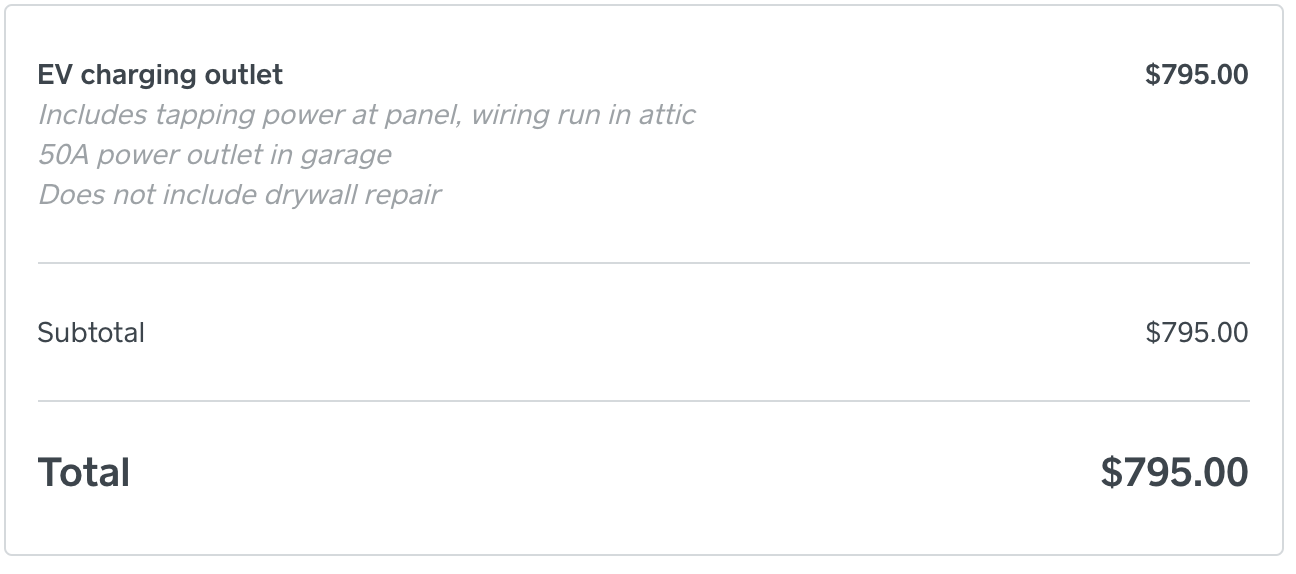
If the electrical panel is nearby your garage and you have the available electrical capacity, then the amount of electrical work and material will be limited. On the other hand, if your home needs a panel upgrade (aka installing more electrical capacity), the amount of electrical work can increase significantly.
Furthermore, some electrical panels, such as ones made by Zinsco or Federal Pacifica, are considered unsafe and are prone to fire hazards. Many electricians will not tough these panels and instead recommend replacing the thing entirely with a new, code-compliant panel.
See the table below for the average installation costs of a new electrical panel.
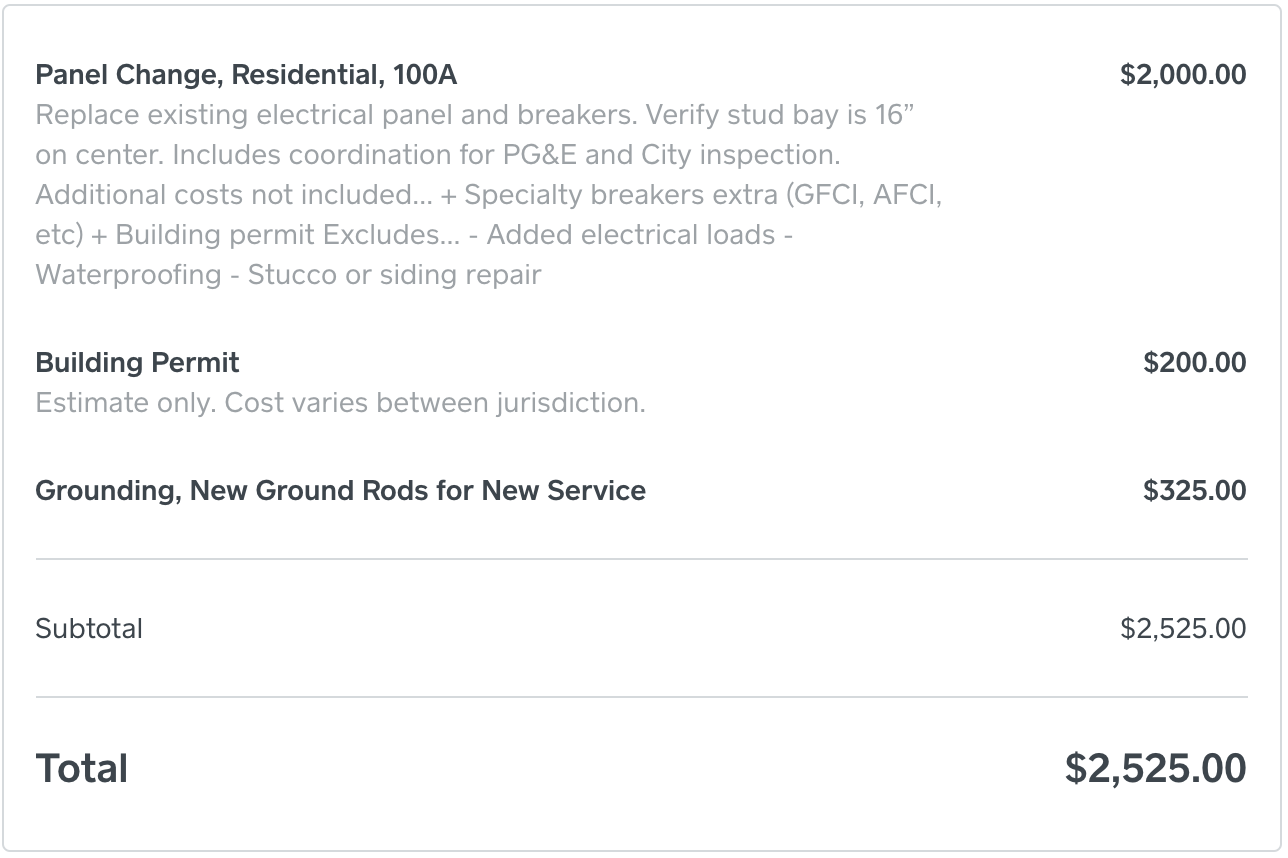
Do not be discouraged! If you already have a 240V outlet that is currently occupied by an appliance such as a dryer, water heater, or welder, you’re in luck! With the NeoCharge Smart Splitter, you can simply plug into your existing outlet to create two 240V outlets--one for your pre-existing appliance and another for your new EV charger. You can potentially save thousands of dollars needing to rewire your home. Additionally, you do not need a permit with the Smart Splitter (more on that next!).
Most homeowners can get Level 2 EV charging at home using a plug-in EVSE and an existing 240-V outlet instead of a hardwired install. If you already have a dryer, range, welder, RV, or garage receptacle (common types include NEMA 14-30, 14-50, or 6-50), a plug-in charger is often the fastest, lowest-cost path to an ev home charger. With a Smart Splitter, you can safely share that single outlet between your appliance and your electric car without rewiring, turning one 240-V receptacle into two managed ports and avoiding most electrician labor, trenching, or panel upgrades. Use properly rated cords, follow the charger’s instructions, and confirm the outlet’s breaker and wiring are sized for continuous EV load to keep your home EVSE safe and reliable.
Electrician Labor
The final piece to installing a home charging station is the labor. In this case, it would mean hiring an electrician. When looking for an electrician it is usually best to get at least three detailed quotes and choose based on experience, insurance, and ratings. Installing an EV charger doesn’t necessarily require an electrician, however, one is highly recommended due for your safety and to ensure you do not void the insurance in your home. When in doubt, hire a licensed electrician!
Like the permit and electrical work, this cost is also fairly subjective. Depending on the amount of work required and your location, you can expect to pay an electrician anywhere from $300 to $1,500. Keep in mind this cost is only for labor. In most cases, your electrician will quote you time and materials, therefore, the total cost of the installation will be higher.
If you do need an electrician, one of our favorite electricians is Treehouse. They're experts when it comes to EV charging, and in addition to working with you to find the lowest-cost charging setup, they'll help you identify applicable rebates and recommend a charger specific to your EV's needs. You can get an instant estimate from them on their website.
Final Thoughts
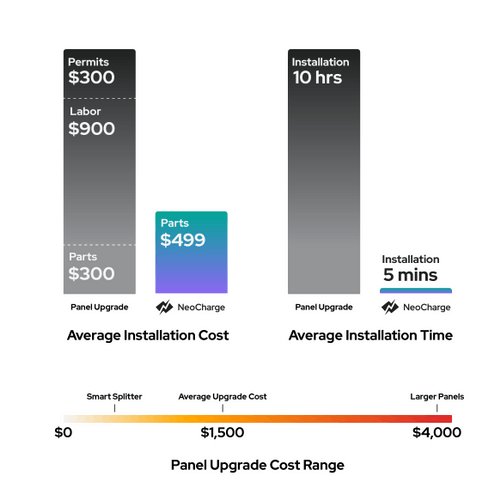
For readers comparing ev charging installation options, plug-in setups typically involve no permanent wiring changes and may not require a permit in many areas, while new circuits or hardwired stations usually do; always check your local authority having jurisdiction. If your panel is tight or the charger location is far from the service panel, a plug-in approach with a Smart Splitter on an existing outlet can reduce installation cost and time dramatically, while still giving you Level 2 speeds and the flexibility to move the charger later. Not sure which outlet you have? Look for the label on the receptacle face or the breaker, or search “electric car charger near me” to find a licensed electrician who can verify outlet type and readiness for a home electric car charging point.
So putting all of these pieces together, you can expect the cost to install a home charging station to be around $1,000 on the low end and over $3,000 on the high end. Of course, your costs will vary depending on the aforementioned factors. Again, if you happen to have an existing 240V outlet, you can skip the permit, electrical materials, and electrician cost with the Smart Splitter. This can save you hundreds, if not, thousands of dollars on the cost to install a home charging station.
Despite this upfront cost, EV drivers still save money by switching to electric. Think of it this way: if you could pay a small fee to install a gas station at your house and pay less for gas than at the pump, wouldn't you do it? With electric cars, you can!
Charge on!
FAQs
What's the cheapest way to install an EV charger at home?
If you have an existing 240V outlet (like for a dryer), the NeoCharge Smart Splitter lets you add EV charging for under $500 without permits or electrician costs.
Do I need a permit to install an EV charger?
Most Level 2 installations require permits ($50-$500), but Smart Splitter installations typically don't need permits since they use existing outlets.
How much does it cost to upgrade my electrical panel?
Panel upgrades range from $1,500-$4,000+ depending on amperage needs and local labor costs.
Can I install an EV charger myself?
While possible, we recommend licensed electricians for safety and code compliance. Smart Splitters can be almost always be self-installed safely and are UL listed.
What rebates are available for EV charger installation?
Federal tax credits up to $1,000, plus state/utility rebates varying by location. Check our rebates page to see what works for you.
How much does EV charging add to my electric bill?
Average $30-60/month for typical driving, but varies by local rates and usage patterns.
Related NeoCharge resources
-
NeoCharge Smart Splitter
Safely share a 240V outlet (dryer + EV) or charge two EVs without a panel upgrade.
-
Shop the Smart Splitter
See specs, compatibility, and pricing.
Key terms
- Level 2 charging
- Level 2 EV charging uses a 240V circuit (like a dryer outlet). It typically adds ~20–35 miles of range per hour, depending on your car and the circuit amperage.
- NEMA 14-50
- A NEMA 14-50 is a common 240V, 50A outlet (often used for EV charging). Many EV chargers plug into it, but the actual charging speed depends on the circuit and your EV.
- NEMA 14-30
- A NEMA 14-30 is a 240V, 30A dryer outlet. With a properly configured EV charger, it can usually support ~24A continuous charging (about 20–25 miles of range per hour for many EVs).
- EVSE
- EVSE stands for Electric Vehicle Supply Equipment (the “charger”). It safely delivers power to your EV and communicates with the car to control charging current.


